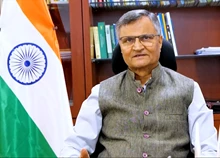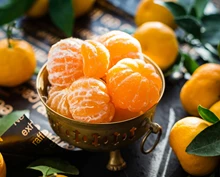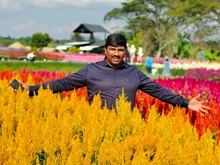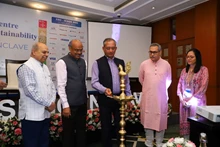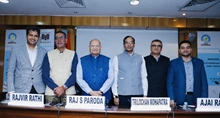
The ICAR-Indian Agricultural Research Institute, New Delhi celebrated its Foundation Day at Dr B.P. Pal Auditorium on April 01, 2024. Dr. Sanjay Kumar, Chairman, of the Agricultural Scientists Recruitment Board, New Delhi delivered the Foundation Day Lecture titled ‘Unlocking Nature’s Vault: Plant Bioresources for a Thriving Economy,’ and Dr. Sudhir K. Sopori, Former Vice-Chancellor, Jawahar Lal Nehru University, New Delhi presided over the function.
Dr. A. K. Singh, Director of ICAR-IARI in New Delhi, highlighted the institute's significant achievements during the past year. In 2023-24, the institute introduced approximately 25 varieties of wheat crops and 42 varieties of flowers, fruits, and vegetable crops for commercial cultivation. Notably, there were remarkable advancements in the production of basmati rice, contributing around USD 5.5 billion to the total agricultural exports of USD 50 billion, which accounts for 10 percent of the total. The Institute's contribution to the development of Basmati Rice varieties stands at around 95 percent.
Moreover, the institute has developed early varieties of paddy, addressing concerns regarding stubble burning in the northwestern plains of northern India, particularly in Punjab and Haryana. Two rice varieties, Pusa 2090 and Pusa 1824, mature within just 120 days, offering yields comparable to Pusa 44, which traditionally takes about 150 days. This addresses the time constraint faced by farmers between wheat harvesting and paddy sowing, potentially reducing stubble-burning incidents. Additionally, the institute has introduced several early varieties in the basmati segment, such as 1509, 1847, and 1692.

In addition to rice varieties, the institute has developed two herbicide-tolerant varieties, facilitating the transition from transplanted rice cultivation to Direct-Seeded Rice. Weed management has been a significant challenge, and these tolerant varieties are expected to aid in Direct-Seeded Rice cultivation.
Regarding wheat, the institute's contributions account for almost 50 million tonnes, covering an area of 10 million hectares planted with IARI varieties. Significant improvements have been made over existing varieties, with the release of the high-yielding variety 3386, which boasts a yield approximately 10 percent higher than its predecessors.
Apart from this, the institute has made strides in developing varieties, particularly hybrids, suitable for bioethanol production. With the government aiming for a 20 percent blending of bioethanol in petrol by 2025, corresponding to around 1500 crore liters of bioethanol, there is a focus on diverting maize for bioethanol production. Special breeding efforts are underway to improve ethanol recovery rates, aiming to enhance economic viability from the current 10-11 percent to 14-15 percent, aligning with rice-based ethanol production.
A short film was shown to give a glimpse of the efforts, achievements, and various activities of the Institute.

Dr. Sudhir K. Sopori highlighted the contributions of Dr. Sanjay Kumar to the country. He informed that Dr Sanjay has made several contributions in the areas of Plant Physiology, Plant Biotechnology and many other areas. His major contributions include discovery of a novel carbon fixation pathway and its transplantation in a heterologous system to reduce photorespiratory losses leading to photosynthetic gain and yield enhancement (work lauded by international fraternity), discovery of autoclavable superoxide dismutase from high altitude plant, its characterisation and modification, plant adaption mechanism at high altitude, cloning of genes for secondary metabolite synthesis and imparting stress tolerance, deciphering the mechanisms of thorn formation in rose, winter dormancy and drought stress in tea, understanding plant-microbe interactions.
Contributed significantly on the development of nutraceuticals using traditional knowledge, and genome and transcriptome sequencing of Himalayan plants and microbes to decipher adaptive mechanisms and secondary metabolites synthesis. Guided 29 MSc/PhD students, holds several international patents and has 211 research/review articles, book chapters, edited book etc. Some of his key contributions have percolated into book and major reviews also.
He was bestowed with the prestigious VASVIK Industrial Research Award; INSA Young Scientist Award; Certificate of Merit in CSIR Leadership Programme; R.D. Asana Endowment Lecture Award; Professor G.V. Joshi Memorial Lecture Award; Prof. Shri Ranjan Memorial Lecture Award, Ultra International Team Award for contribution in Essential Oil Industry; Outstanding Alumnus Award of College of Basic Sciences and Humanities by G.B. Pant University of Agriculture and Technology, Pantnagar; Dr. Subodh Kumar and Mamata Mukherjee Memorial Award by SFE.
"As the Director of CSIR-IHBT, Dr Sanjay vitalised several initiatives for empowering society/farmers, which include successful procurement and introduction of asafoetida and monk fruit in the country, and introduction of saffron, apple, cinnamon, liquorice, lilium and tulip in non-traditional areas; technologies for waste management and Shiitake mushroom production. Promoted aromatics in mountain farming to make Himachal as the top state in country for production of essential oil of wild marigold. Coordinated multi-institutional projects of CSIR as Director of Agri, Nutri and Biotech Theme, as well as Nutraceuticals and Nutritionals Missions, for delivery of envisaged outcomes," said Dr. Sudhir K. Sopori.

In his address, Dr. Sanjay Kumar described IARI as the 'Iconic Architect of Revolutionary Innovations' and Pusa as a 'Publically Useful Solutions for Agriculture'. He emphasized the significance of 'Prosperity', a key focus for MS Swaminathan, stressing its link to the economy. Dr. Kumar discussed the concept of Bio-Economy, which encompasses research and innovations in biosciences aimed at driving economic activity. He highlighted India's Bioeconomy, noting its growth from USD 137.24 billion in 2022 to a target of surpassing USD 150 billion by 2024 and reaching USD 300 billion by 2023. The components of India's Bioeconomy include BioIT, BioAgri (such as BT Cotton and BioPesticides, valued at around USD 11.5 billion annually), Bio-Research, Bio-Industrial, and Bio-Pharma.
Moreover, Dr. Kumar shared insights from his research project on Potentilla atrosanguinea. He explained that Superoxide dismutase (SOD) plays a crucial role in defending against injuries caused by reactive oxygen species (ROS). The SOD enzyme derived from Potentilla atrosanguinea, a high-altitude plant, is notable for its unique thermostable properties, remaining functional even at subzero temperatures—a remarkable feat in enzymology. Thereby he shared his insights on Carbon Fixation at high altitudes, Biopastic economy, New Generation Farming Systems (Tissue Culture, Aeroponics, Hydroponic), HP’s First Tulip Garden using Bulbs Produced in India (Palampur-The Tulip City), Leh-The Lilium City, Aroma Economy, Introduction of Apples in North-Eastern States of India.
He further emphasized the acquisition of Ferula assa-foetida (Heeng) from Afghanistan facilitated by ICAR-NBPGR, New Delhi. The initial plantation took place on October 15th, 2020, in a farmer's field located in the village of Kwaring, nestled within the Lahaul Valley of Himachal Pradesh. This initiative extended to approximately 249 sites for seed production and encompassed 93 villages across five districts. He highlighted how True Dalchini (Cinnamomum Verum), and Monk Fruit, Liquorice (Mulethi) are introduced in Himachal Pradesh, and Saffron cultivation in non-traditional areas in Himachal, Uttarakhand.

Following the award distribution ceremony, Dr. A.K. Singh gifted Dr. Sanjay Kumar a memento and shawl as a token of remembrance for the memorable occasion.






